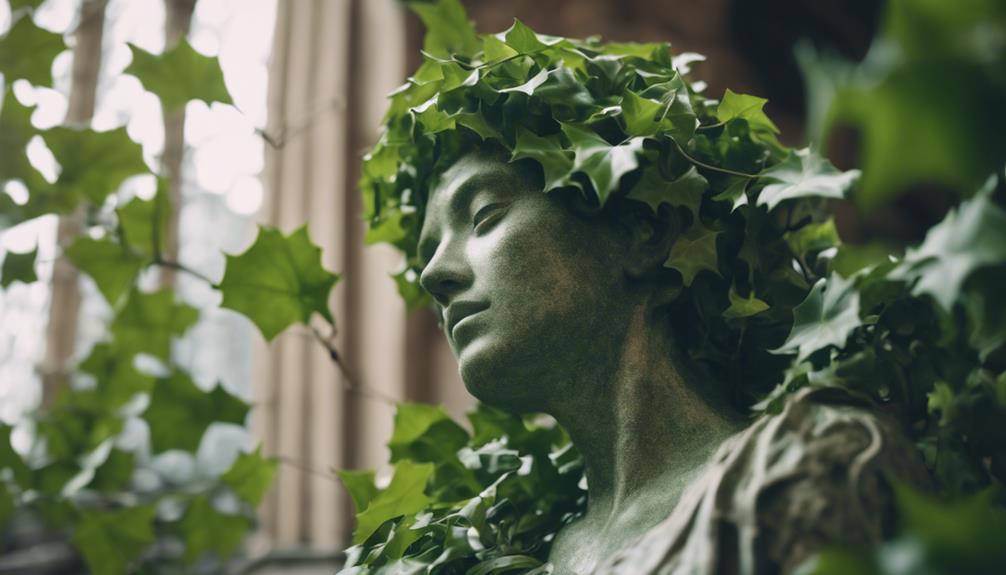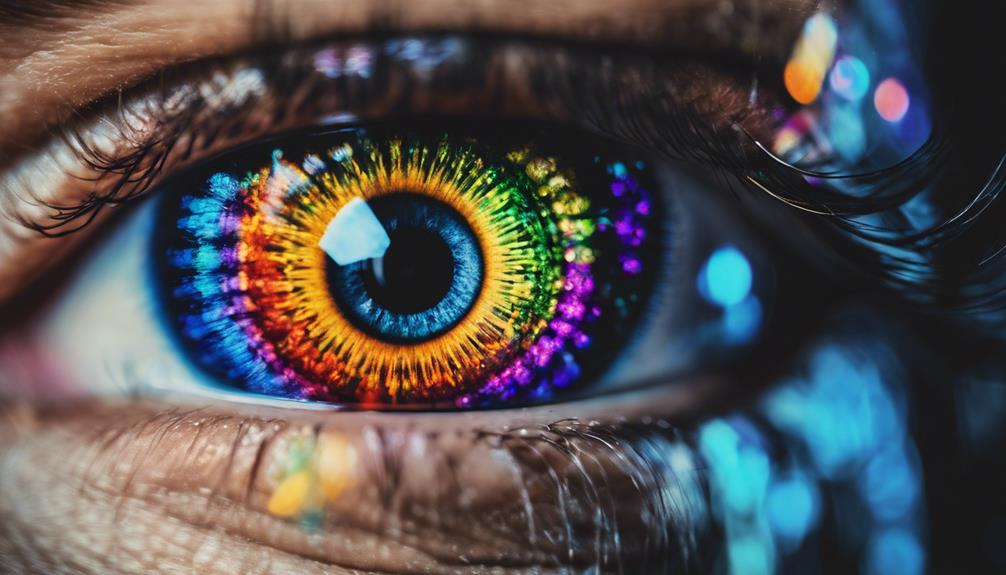Cultures around the world see ivy as a powerful **symbol** of immortality, loyalty, renewal, love, and personal growth. In both ancient Egypt and Greece, ivy stood for eternal life and rebirth. Today, it represents lasting values like fidelity and resilience. History shows that ivy has always been a sign of hope, friendship, and transformation, inspiring many people and artists. Its evergreen nature symbolizes growth and renewal, pushing us to welcome change. Dive deeper into the rich cultural stories about ivy to find more hidden meanings and symbolism.
Key Takeaways
- Ivy symbolizes immortality, loyalty, and renewal in various cultures.
- Ancient civilizations like Egypt and Greece associate ivy with eternal life and rebirth.
- Ivy is linked to Greek gods like Dionysus and Attis, symbolizing vitality.
- Ivy represents enduring love, loyalty, and passion in weddings and friendships.
- The plant symbolizes personal growth, resilience, and transformation in art and modern society.
Historical Roots of Ivy Symbolism
Throughout history, cultures worldwide have attributed deep symbolic meanings to ivy, tracing back to ancient civilizations like Egypt, Greece, and Ireland. The ancient symbolism of ivy holds significant importance in various cultures, symbolizing themes of immortality, loyalty, and renewal.
In ancient Egypt, ivy was connected to Osiris, the god of the afterlife, representing eternal life and fidelity. The Greeks associated ivy with Dionysus, the god of wine and fertility, believing it to have protective qualities. Ivy's evergreen nature also played a pivotal role in symbolizing hope during dark seasons in different societies.
Its ability to thrive and remain green throughout the year further emphasized the idea of perseverance and everlasting life. The historical roots of ivy symbolism are deeply entrenched in the beliefs and traditions of ancient civilizations, highlighting the enduring significance of this versatile plant across diverse cultures.
Ivy in Ancient Mythology

In ancient mythology, ivy held significant symbolism that represented various themes such as vitality, immortality, and rebirth.
Greek gods like Dionysus and Attis were closely associated with ivy, embodying ideas of life, death, and renewal.
The presence of ivy in mythological stories often served as a visual cue for these intricate narratives.
Ivy in Legends
Entwined with ancient deities and muses, ivy emerges as a powerful symbol of energy and creativity in Greek mythology. Dionysus, the god of wine and fertility, is often associated with ivy, signifying vigor and vitality.
Thalia, the muse of comedy, is frequently depicted with ivy, symbolizing creativity and joy. In the domain of Greek mythology, Attis, a god of vegetation, is connected to ivy, representing themes of death and rebirth, portraying renewal and transformation.
Additionally, ivy was considered sacred to Osiris in Egyptian mythology, embodying immortality and everlasting life. The enduring nature of ivy across various mythologies underscores its symbolism of rebirth and eternal life.
Symbolism in Ivy
With its deep-rooted connections to ancient deities and muses, ivy symbolizes a rich tapestry of energy and creativity in Greek mythology. In ancient times, ivy held significant symbolism as seen in various myths:
- Dionysus: Ivy represents vigor and vitality, closely associated with the Greek god of wine and fertility.
- Thalia: The muse of comedy, often depicted with ivy, showcases its link to creativity and celebration.
- Osiris: In ancient Egypt, ivy was sacred to Osiris, symbolizing immortality and the eternal cycle of life and death.
These connections highlight the multifaceted significance of ivy in ancient mythology, portraying themes of vigor, creativity, immortality, and regeneration.
Ivy as a Symbol of Love

Symbolizing enduring love and loyalty, ivy holds a significant cultural meaning as a representation of unwavering devotion.
In ancient Greek mythology, the ivy plant was associated with Dionysus, the God of wine, symbolizing passion and desire. This connection highlights ivy's deep-rooted association with romantic love and emotional intensity.
The presence of ivy in weddings underscores its role in symbolizing the eternal love and commitment shared between partners. The evergreen nature of ivy further emphasizes the everlasting quality of love and relationships, showcasing its enduring significance as a symbol of loyalty and devotion throughout history.
Whether intertwined in bouquets, decorating wedding venues, or adorning gifts, ivy continues to serve as a powerful emblem of love's lasting strength. Its lush green leaves and climbing vines beautifully encapsulate the depth of emotions and the unwavering dedication found in profound and lasting love.
Ivy's Representation of Friendship

Moving from its association with love, ivy also carries deep significance as a symbol of friendship in various cultures and traditions. Ivy leaves have long been linked to the representation of strong bonds between friends, emphasizing the value of loyalty and trust in relationships. Here are three key ways in which ivy symbolizes friendship:
- Interconnected Growth: Ivy's intertwining vines symbolize the interconnectedness and resilience found in lasting friendships, where individual lives are intertwined to create a strong and supportive network.
- Gift of Friendship: Giving a gift of ivy to a friend can convey a profound message of friendship and the desire for enduring connections, highlighting the importance of nurturing and maintaining these relationships.
- Enduring Nature: The evergreen quality of ivy mirrors the enduring nature of true friendships, emphasizing how these bonds can weather challenges and remain vibrant and strong over time.
Understanding the cultural meanings attached to ivy leaves provides insight into the deep-rooted significance of friendship in different societies.
Ivy's Significance in Transformation

Ivy holds great significance in transformation as it symbolizes change, growth, and renewal. Its ability to adapt and climb mirrors the evolution we undergo in life.
Through ivy, we see a reflection of the continual process of growth and development.
Symbolism in Change
In the domain of cultural symbolism, ivy's significance in transformation emerges as a powerful motif representing growth and adaptation in varying contexts. Ivy symbolizes change through its climbing and spreading tendencies, embodying the idea of evolution over time.
The plant's ability to thrive in diverse environments showcases resilience and adaptability, essential qualities in the face of transformation. In literature and mythology, ivy often symbolizes personal development and the journey of change, emphasizing the plant's role in signifying new beginnings.
The cyclical nature of life is highlighted through ivy's symbolism, portraying the continuous cycle of growth and renewal.
- Ivy's climbing and spreading tendencies represent evolution over time.
- The plant's resilience and adaptability showcase its ability to thrive in diverse environments.
- Ivy's symbolism in literature and mythology emphasizes personal development and new beginnings.
Growth and Renewal
With its evergreen nature and resilient character, ivy symbolizes growth and renewal in diverse cultural contexts. The plant's ability to thrive under various conditions mirrors the resilience needed for personal and spiritual growth.
Ivy's climbing and creeping characteristics embody transformation and adaptability, inspiring individuals to embrace change and overcome challenges. Across different cultures and mythologies, ivy's presence underscores its association with the cyclical nature of life and the opportunity for rejuvenation.
The continuous growth and spread of ivy vines serve as a reminder of the constant evolution and renewal present in our lives. Through its symbolism of transformation, ivy encourages us to navigate life's twists and turns, emerging stronger and more resilient in the process.
Evolution Through Ivy
Embodying the essence of growth and adaptability, ivy serves as a potent symbol of transformation in various cultural narratives and belief systems. Ivy's significance in evolution is deeply rooted in its ability to climb and thrive in diverse environments, mirroring the process of personal growth and progress.
The evergreen nature of ivy symbolizes continuity and the cyclical nature of life's changes, highlighting the concept of transformation as an ongoing journey. Additionally, ivy's resilience in fluctuating conditions represents the idea of adaptability and the capacity to embrace change as a catalyst for personal development. The intertwining and binding characteristics of ivy reflect the interconnectedness of different stages of transformation, emphasizing the importance of embracing evolution in various aspects of life.
- Ivy's climbing ability mirrors growth and progress.
- The evergreen properties symbolize continuity and cyclical changes.
- Resilience in changing conditions signifies adaptability and personal transformation.
Cultural Meanings of Ivy in Art

Throughout art history, ivy has served as a powerful symbol conveying themes of fidelity, eternal life, and transformation. Ivy is often depicted in various art forms, such as paintings, sculptures, and jewelry designs, to symbolize different aspects of life and nature. Artists utilize the ivy leaf to represent concepts like love, friendship, and growth, infusing their works with layers of meaning and symbolism. In jewelry design, ivy is often used to symbolize resilience, personal growth, and adaptability, reflecting the enduring qualities associated with this evergreen plant.
Moreover, in art, ivy can also symbolize obsession, entanglement, and the interconnectedness of nature. The intricate and twisting nature of ivy vines is frequently used to convey complex emotions and relationships, showcasing the deep connection between human experiences and the natural world. The symbolism of ivy in art not only reflects its rich cultural significance but also highlights its enduring appeal in creative expression, making it a timeless motif in artistic representation.
Ivy Symbolism in Modern Society

Ivy's enduring symbolism in modern society resonates with themes of loyalty, eternity, and resilience, reflecting its timeless connection to nature and values. In today's culture, ivy holds significant meaning and is often associated with immortality and eternal life, making it a powerful symbol in various contexts.
Here are some key points highlighting the symbolism of ivy in modern society:
- Ivy's presence in contemporary culture symbolizes immortality and eternal life, adding depth to its symbolism beyond mere aesthetics.
- The use of ivy in jewelry design has become popular, conveying messages of love, friendship, and personal growth to wearers.
- Ivy's symbolism in modern society serves as a reminder of the enduring values and connections to nature that have transcended time, making it a cherished symbol in today's world.
Ivy's Connection to Eternal Life

With its evergreen leaves symbolizing continuity and immortality, ivy's connection to eternal life transcends cultural boundaries and resonates deeply across various traditions. Ivy's association with eternal life is evident in its symbolism in different mythologies and cultures. In ancient Egypt, ivy was dedicated to Osiris, representing rebirth and everlasting life. This symbolism has persisted through the ages, with ivy often depicted in art and literature as a symbol of immortality and the cyclical nature of existence.
| Ivy's Connection to Eternal Life |
|---|
| Symbolizes continuity and immortality |
| Associated with everlasting qualities |
| Often dedicated to Osiris in ancient Egypt |
| Resonates across different cultures |
| Frequently depicted in art and literature |
Furthermore, ivy's connection to eternal life is strengthened by its association with wine, a beverage often linked to rituals and celebrations of life and immortality. This enduring symbol of ivy as a representation of eternal life serves as a powerful reminder of the enduring nature of existence and the timeless quality of love and rebirth.
Ivy's Role in Personal Growth

Our exploration now shifts to the significance of ivy in fostering personal growth and transformation across diverse cultural contexts. Ivy's role in personal growth is deeply rooted in ancient beliefs, particularly in Ancient Greece, where it was associated with Dionysus, the god of fertility, wine, and ecstasy.
Here are three key aspects highlighting ivy's impact on personal growth:
- Resilience and Adaptability: Ivy's symbolism of personal growth stems from its resilient nature, representing the ability to adapt and thrive even in challenging environments. This resilience encourages individuals to persevere through obstacles and continue evolving.
- Symbol of Progress and Development: In jewelry design and artistic representations, ivy motifs are often used to convey themes of progress and development. The intricate intertwining vines serve as a reminder of the continuous growth and transformation individuals experience throughout their lives.
- Reflection of Personal Evolution: Ivy's climbing and spreading characteristics mirror the journey of personal evolution, symbolizing the gradual but constant progress individuals make towards self-improvement and enlightenment. Through its symbolism, ivy inspires individuals to embrace change and commence on new beginnings in their personal growth journey.
Frequently Asked Questions
What Do Ivies Represent?
Ivies represent fidelity and eternal life, symbolizing hope and renewal across various cultures.
In ancient Egypt, ivy signified immortality, while in Greek culture, it was linked to Dionysus for its vitality.
European, Irish, Norwegian, and Germanic cultures have revered ivy for centuries.
Its evergreen nature and association with spring offer a promise of life and continuity.
What Does the Ivy Plant Symbolize Spiritually?
Fundamentally, the ivy plant symbolizes loyalty and everlasting love. Its intertwining vines represent the interconnectedness of all living beings.
Ivy's resilience mirrors the enduring strength of the human spirit. Embracing ivy's symbolism can foster a sense of connection to something greater than ourselves.
Essentially, ivy serves as a reminder of the unbreakable bonds that tie us to our beliefs and loved ones.
What Does the Ivy Symbolize Pagan?
In pagan beliefs, ivy symbolizes eternal life and regeneration. It represents the cycle of life, death, and renewal, embodying the interconnectedness of nature's cycles.
Pagan rituals often incorporate ivy to honor these themes and the changing seasons. The evergreen nature of ivy signifies continuity and the enduring essence of life.
It serves as a powerful symbol of rebirth and the eternal cycle of existence in pagan traditions.
What Does the Ivy Branch Symbolize?
The ivy branch symbolizes fidelity, eternal life, and strong bonds in various cultures. It's often used in weddings to represent lasting love and loyalty between partners.
In ancient Egypt, the ivy branch was dedicated to Osiris, symbolizing immortality and eternal renewal. Ivy branches are associated with Dionysus in Greek mythology, representing vitality, growth, and connection to nature.
The ivy's evergreen nature symbolizes hope and resilience during challenging times.
How Does Ivy Symbolize Cultural Meanings Similar to Waist Beads?
Ivy, like the cultural significance of waist beads, carries deep cultural meanings across various traditions. Ivy symbolizes resilience, growth, and strength, while waist beads represent femininity, spirituality, and rites of passage. Both hold significant cultural symbolism, expressing heritage and tradition through their symbolic use in rituals and celebrations.
Conclusion
To sum up, the cultural meanings of ivy are diverse and rich, spanning centuries and civilizations. From symbolizing love and friendship to representing eternal life and personal growth, ivy holds a significant place in art, mythology, and modern society.
For example, in Greek mythology, ivy was associated with Dionysus, the god of wine and revelry, highlighting its connection to celebration and transformation. Its enduring symbolism continues to captivate and inspire us today.









